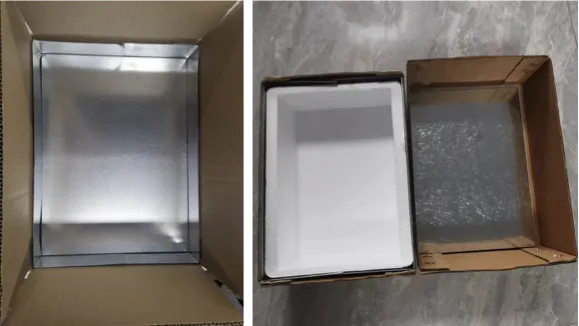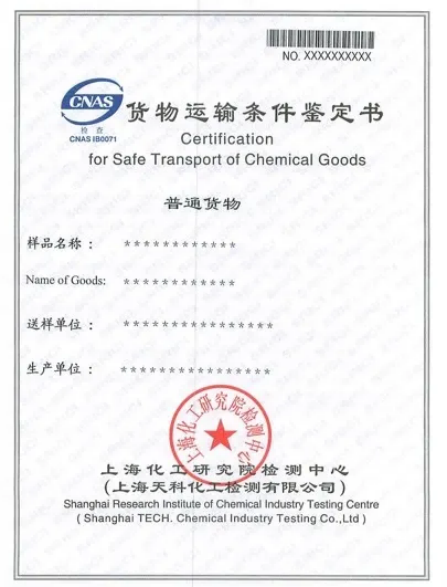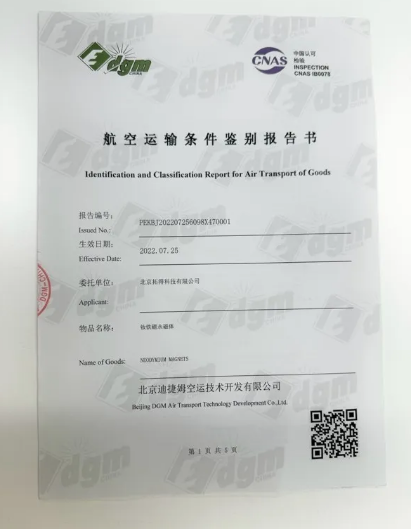Aviation transportation has certain particularities. To ensure safety, both passengers and goods need to undergo security checks before boarding an aircraft. If you carry magnetic materials when taking a flight, such as NdFeB strong magnets, or if the customer is in urgent need of the goods and hopes that the manufacturer ships them by air, can we bring magnets on the plane in such cases? Since weak stray magnetic fields can interfere with the aircraft's navigation system and control signals, the International IATA (Air Transport Association) classifies magnetic goods as Class 9 dangerous goods and imposes restrictions on their acceptance for carriage. Therefore, nowadays, some air cargo containing magnetic substances is required to undergo magnetic testing to ensure the normal flight of the aircraft. Magnetic materials, audio materials, and other instruments with magnetic accessories all need to be subject to magnetic testing.
Air Freight Standard
According to the relevant provisions of IATA 902: If the maximum magnetic field strength measured at a distance of 2.1 meters from the object being tested does not exceed 0.159 A/m (200 nT, equal to 2 mGs = 0.002 Gs), then this item will not be restricted as a magnetic substance and can be handled as general cargo. If the maximum magnetic field strength measured at a distance of 2.1 meters from the object being tested exceeds 0.159 A/m, but the magnetic field strength at any point at a distance of 4.6 meters from the surface of the object being tested is less than 0.418 A/m, then this cargo can be accepted for shipment as dangerous goods. If this requirement cannot be met either, then this item is strictly prohibited from being transported by air.
How to Meet the Air Freight Standard
In order to meet the above air freight requirements, it is necessary to demagnetize the magnets to be transported by air. Although it is called "demagnetization", in fact, it is not to demagnetize the magnet itself, but to make the magnetism displayed by the packaging meet the national requirements for safe air transportation through proper packaging. For shielding packaging, high-permeability magnetic materials are generally used, such as cold-rolled sheets, galvanized sheets, etc. If there is a large quantity of magnetic materials, several layers of packaging are required. The magnetic permeability of high-permeability magnetic materials is extremely high. According to Faraday's cage principle, after packaging, the magnetic field mainly circulates inside the box, and very little of it leaks out. After the shielding packaging, it is further packaged with a carton or a wooden box (see the following picture).

Magnetic Detection
Airlines or logistics companies that undertake the transportation of magnetic materials will require customers to conduct magnetic detection and issue a Report on the Identification of Air Transport Conditions to ensure the normal flight of the aircraft. Generally, the air freight appraisal can only be issued by a qualified professional appraisal company recognized by the civil aviation administration of the country. Usually, it is necessary to send samples to the appraisal company for professional testing, and then the appraisal report will be issued. If it is inconvenient to send samples, professional personnel from the appraisal company will conduct on-site testing, and then issue the appraisal report. The validity period of the appraisal report is generally for the current year. After crossing the year, it generally needs to be redone.


When conducting magnetic detection, customers are required to pack the goods in accordance with the air freight requirements. The detection will not damage the packaging of the goods. In principle, the goods will not be unpacked during the detection. Instead, only the stray magnetic fields of the six sides of each piece of goods will be detected.
If the goods fail the magnetic detection, special attention should be paid. First, with the consent of the customer, the magnetic inspection staff will be entrusted to open the goods for inspection, and then put forward relevant reasonable suggestions according to the specific situation. If the shielding can meet the requirements of air transportation, the goods will be shielded according to the customer's entrustment, and relevant fees will be charged.
Domestic Shipment
Mainstream logistics companies such as SF Express and STO Express DONOT accept air freight orders for magnetic materials. These materials can only be transported by land.
As for EMS, if customers can provide the Report on the Identification of Air Transport Conditions, the express collection staff will determine whether to accept the shipment according to the specific situation.
Overseas Shipment
Both DHL and UPS require customers to conduct magnetic detection. DHL can act as an agent to apply for the detection, and the cost will be borne by the customer.











